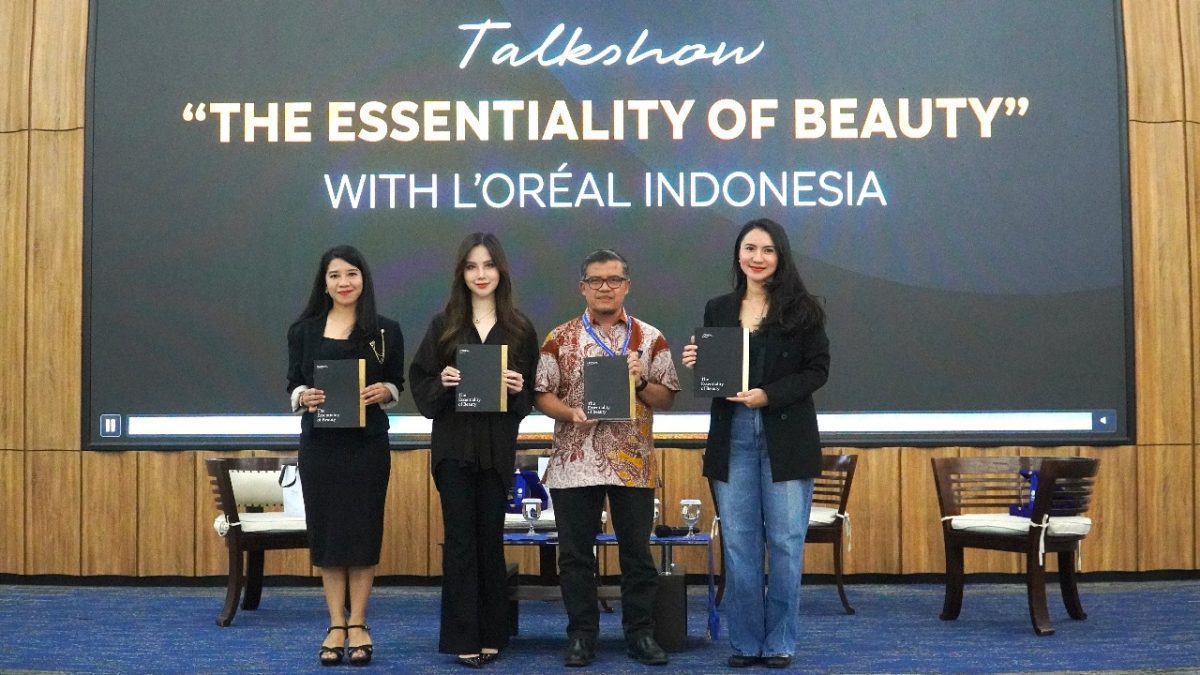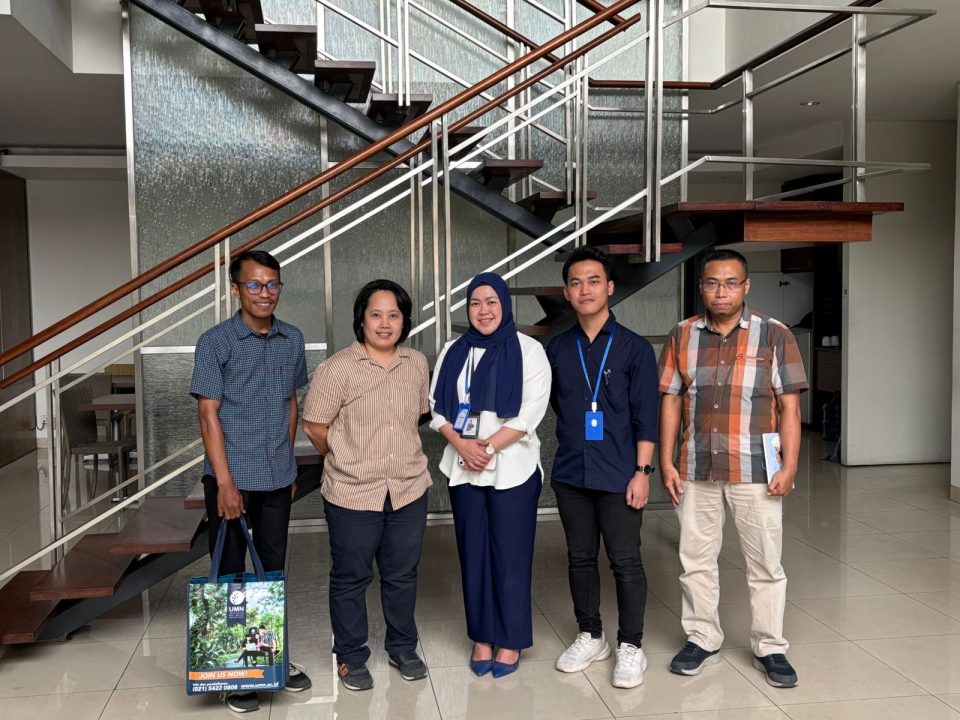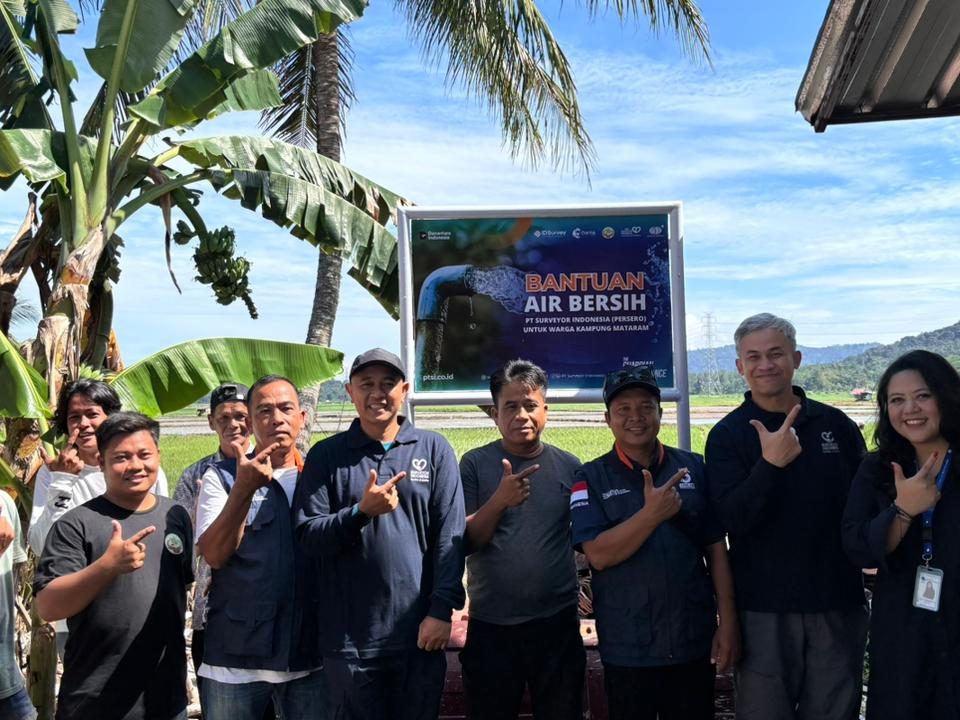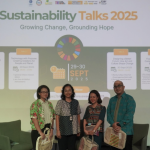
UMN Sustainability Talk: Industry and Students Promote Sustainable Circular Economy
September 30, 2025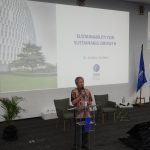
UMN Sustainability Week Highlight: The Role of Higher Education Institutions in Realizing Sustainability in Indonesia
October 3, 2025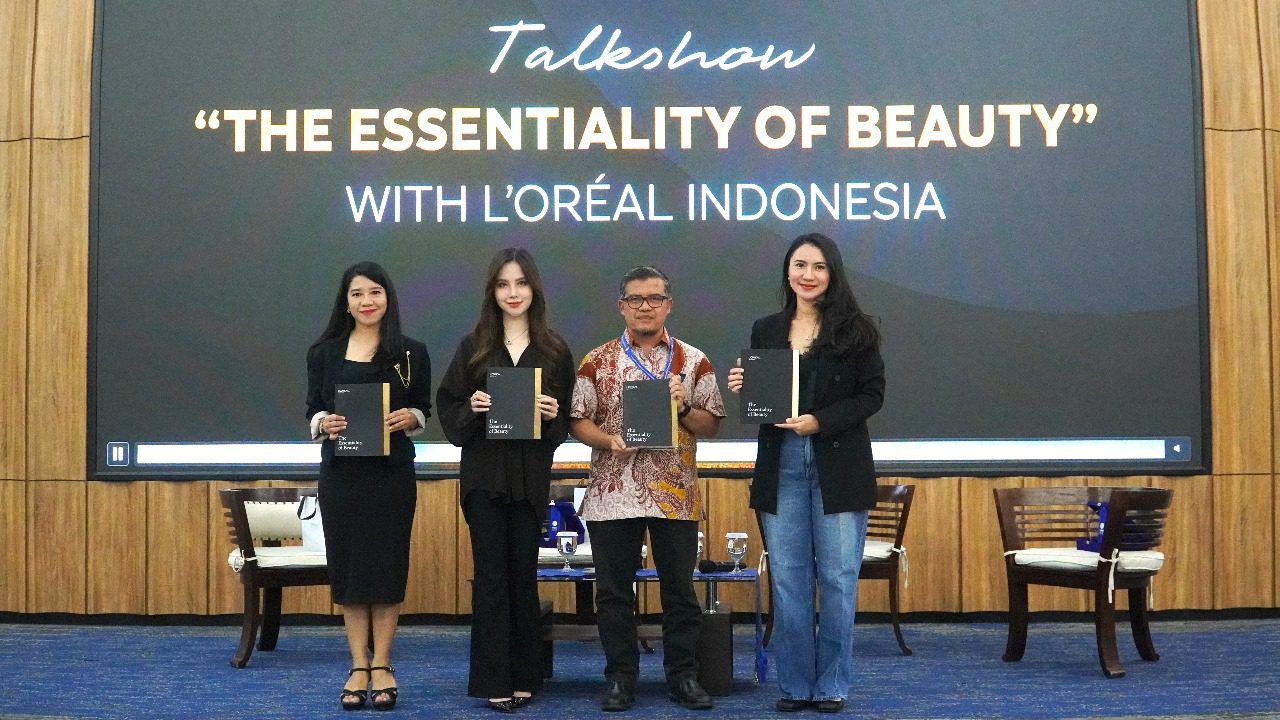
Group photo with Cendera, Agatha, Melanie, and the Dean of the Faculty of Communication Sciences, UMN. (Doc. UMN)
Tangerang – On Friday (09/19/2025), L’Oréal Indonesia and the Faculty of Communication Sciences UMN held a talk show on the “Essentiality of Beauty”. The talk show was hosted by three speakers: Cendera Rizky Anugrah Bangun, S.Sos., M.Si., Head of Communications Science at UMN; Melanie Masriel, Chief of Corporate Affairs, Engagement, & Sustainability at L’Oréal Indonesia; and Agatha Chelsea, B.Sc., Entertainer, Neuroscience Educator, and Founder of Neuronedu. The event was held at the Function Hall, UMN.
The beauty world is moving faster than ever, not only in terms of innovation but also in terms of developing values. L’Oréal, as one of the global beauty industries, is committed to providing quality products, sustainability, and social impact. This event aimed to explore beauty from three perspectives: industry, influencers, and academics.
“This event will explore a book that discusses beauty, which is expected to open up new perspectives. Beauty is not only about a pretty face or a handsome face, but also about balance, unity, and diversity,” Dr. Rismi Juliadi, Dean of the Faculty of Communication Sciences at UMN, said in his opening remarks for the talk show.
For Rismi, this event was inspiring and provided valuable insight for UMN students. Rismi hoped that this event would combine various perspectives, including scientific, industrial, and those of the younger generation. In addition, it was hoped that this event would open the way for students’ careers at L’Oréal Indonesia.
The talk show discussed the book The Essential of Beauty, which has three chapters covering beauty in terms of economic growth, beauty in terms of social and cultural aspects, and beauty in terms of health aspects. During the session, Melanie emphasized that cosmetics are universal and are not only used by women. The cosmetics and beauty industry is not limited to women but is open to all genders. In addition, the talk show also discussed how sustainability is applied in the beauty industry.
“The beauty industry in Indonesia is one of the biggest potentials, especially now that so many influencers and affiliates are working in the beauty industry. This is also supported by data estimating that the growth of cosmetics and personal care in 2025 will reach 48% and will continue to grow, so that the beauty industry will become even more massive,” Melanie Masriel, Chief of Corporate Affairs, Engagement, & Sustainability at L’Oréal Indonesia, explained in her introduction to cosmetics.
Agatha Chelsea, B.Sc., an entertainer and Neuroscience expert, also shared her perspective on the beauty industry in Indonesia. Agatha explained that beauty is not just about cosmetics; it has many dimensions. For Agatha, beauty is something that makes us feel comfortable and happy with ourselves.
“My perspective on beauty is that it gives me identity and more confidence. Beauty is a medium to explore myself and try different makeup styles, hairstyles, and new products. It also helps us determine how we want to be seen by the world. Considering that Gen Z is still searching for their identity,” Agatha explained.
From a neuroscience perspective, Agatha also explained how beauty and cosmetics make us feel happier due to the release of chemicals that boost dopamine and serotonin. She stated that besides making her happier, beauty offers many job opportunities and growing potential.
Cendera Rizky Anugrah Bangun, M.Si., Head of Communication at UMN, also explained from a communication perspective that beauty and cosmetics are not only viewed from the outside when purchasing a product in the current era. The most important and main point is also brand identity, which is in line with the current focus of the Faculty of Communication Sciences on sustainability. This sustainability is also inherent in beauty brands, including L’Oréal.
“From an academic perspective, beauty is closely related to communication studies. This is explained by the symbolic interaction theory, where beauty is not just about dressing up but also about creating opportunities and being accepted by society, building perceptions about how we want to be seen by others,” Cendera said.
Beauty and Sustainability
Many groups, especially Gen Z, are currently echoing the issue of sustainability in the beauty industry. The three speakers also stated that sustainability concerns not only in terms of products but also the positive impact on people’s mental health.
“According to existing data, 82% of Gen Z are willing to pay more for sustainable products, from the production process to the final product. They don’t just think about good products, but also sustainable profits. This aligns with L’Oréal, which is very concerned with sustainability,” Melanie explained.
Melanie emphasized that L’Oréal not only prioritize product quality but also what they want to give to the environment, society, and economy. This starts with L’Oréal’s recyclable packaging, which results in zero waste production.
“I have read several journals and seen that L’Oréal products are committed to sustainability. The issue of sustainability is also not far off and is already well known among students. We continue to shape mining students on sustainability issues, starting with small things such as refilling water and reducing things that can be more sustainable,” Cendera explained in the discussion.
Cendera also advised students to choose cosmetics and brands closely related to sustainability. This way, we can all contribute positively and raise awareness about sustainability through what we use. In addition to environmental and production sustainability issues, the discussion addressed the sustainability aspects of psychological health.
“Generation Z is currently very familiar with and aware of mental health and self-confidence issues. This is important and part of a healthy lifestyle. Cosmetics are one way to boost self-confidence and a form of self-care,” Agatha said.
Agatha also presented data from the World Health Organization (WHO) indicating that by 2030, mental health will become a pandemic. For Agatha, this is not just about science but also about proven science. Agatha urged students to continue caring for themselves, whether women or men, because beauty and cosmetics are equally crucial for all genders.
By Rachel Tiffany
English translation by Levina Chrestella Theodora
Kuliah di Jakarta untuk jurusan program studi Informatika| Sistem Informasi | Teknik Komputer | Teknik Elektro | Teknik Fisika | Akuntansi | Manajemen| Komunikasi Strategis | Jurnalistik | Desain Komunikasi Visual | Film dan Animasi | Arsitektur | D3 Perhotelan , di Universitas Multimedia Nusantara.

